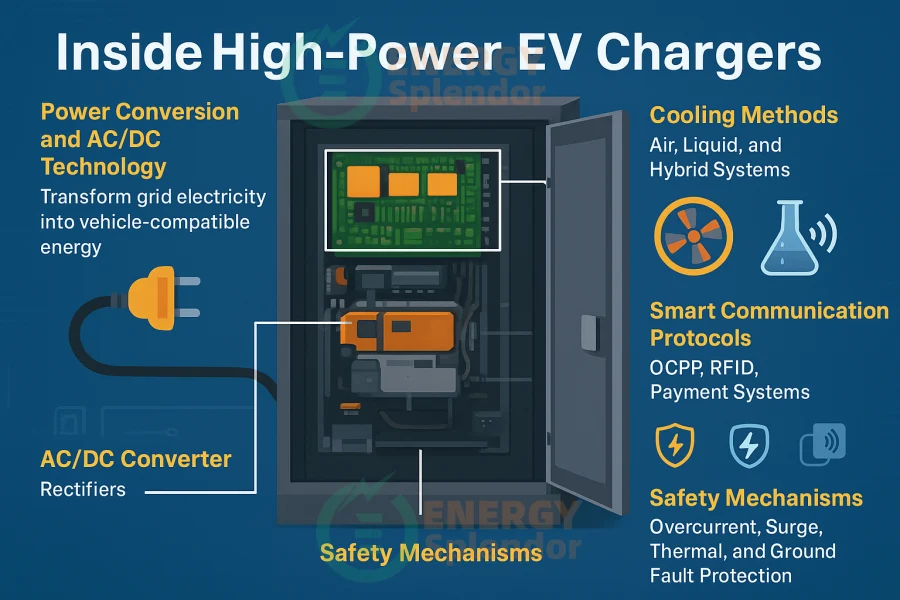As electric vehicles (EVs) become a global standard for transportation, high-power EV chargers are increasingly critical for commercial fleets, public charging stations, and highway networks. Charging stations in the 60–240kW range enable rapid refueling, reducing downtime and supporting large-scale EV adoption. Understanding the technology behind DC fast chargers and high-power AC/DC EV chargers helps businesses, fleet operators, and infrastructure developers make informed decisions. At Energysplendor, we provide customizable, wholesale, and OEM high-power EV charging solutions for clients worldwide, including North America, Europe, South America, Asia, and Africa.
Power Conversion and AC/DC Technology
High-power EV chargers rely on advanced power conversion systems to transform grid electricity into vehicle-compatible energy. Key components include:
-
AC/DC Converters: Transform alternating current (AC) from the grid into direct current (DC) for rapid EV battery charging. This is essential for DC fast chargers, which operate at 400–900V DC.
-
Rectifiers: Ensure stable DC output, maintaining constant voltage and current for efficient charging.
-
Power Electronics Modules: Include insulated-gate bipolar transistors (IGBTs) or silicon carbide (SiC) semiconductors for high-efficiency energy conversion.
These components collectively ensure that high-power AC/DC EV chargers deliver reliable, high-speed energy transfer while minimizing power loss and maximizing efficiency. Businesses deploying DC fast charger technology can reduce operational costs and accelerate fleet turnover.
Cooling Methods: Air, Liquid, and Hybrid Systems
High-power EV chargers generate substantial heat during operation, making effective cooling essential for safety, longevity, and performance. Common cooling strategies include:
-
Air Cooling: Cost-effective, suitable for 60–120kW chargers in moderate-demand applications. Uses fans and heat sinks to dissipate thermal energy.
-
Liquid Cooling: Preferred for 150–240kW chargers, especially in high-traffic stations. Circulates coolant around power electronics and charging cables to prevent overheating.
-
Hybrid Cooling: Combines air and liquid systems for optimal thermal management in ultra-high-power stations.
By integrating advanced cooling technologies, Energysplendor high-power EV chargers maintain operational stability even under heavy commercial use.
Smart Communication Protocols
Modern high-power EV chargers are equipped with intelligent communication systems to streamline operation and enhance user experience:
-
OCPP (Open Charge Point Protocol): Enables interoperability between different EV chargers and management software, allowing businesses to monitor performance, schedule maintenance, and manage energy loads.
-
RFID Authentication: Simplifies access for fleet vehicles, commercial drivers, and authorized personnel.
-
Payment Systems Integration: Supports contactless payments, subscription models, and corporate billing, improving convenience and cash flow.
By using OCPP EV charger technology, operators can implement smart charging networks, track energy consumption, and integrate chargers with renewable energy sources or energy storage systems.
Safety Mechanisms
Safety is paramount in high-power EV charging, especially when dealing with 60–240kW DC fast chargers. Key safety features include:
-
Overcurrent Protection: Automatically shuts down the charger during abnormal current flow to prevent damage to vehicles or equipment.
-
Surge Protection: Guards against lightning strikes, voltage spikes, and grid instability.
-
Thermal Monitoring: Tracks temperature of power electronics and charging cables to prevent overheating.
-
Insulation and Ground Fault Detection: Ensures electrical isolation and prevents hazards in public or fleet environments.
Energysplendor high-power AC/DC EV chargers come with full safety certifications, making them ideal for commercial fleets, highway service stations, and public charging networks.
Applications Across Commercial and Public Sectors
-
Fleet Depots: Rapidly charge delivery trucks, buses, and logistics vehicles to maintain continuous operation.
-
Highway Charging Stations: Enable long-distance EV travel with minimal downtime.
-
Corporate & Municipal Installations: Support employee fleets, public buses, and municipal EV programs.
-
Renewable Energy Integration: Smart chargers can be paired with solar or wind systems for sustainable operations.
Combining DC fast charger technology with smart communication protocols allows businesses to optimize energy consumption, reduce operational costs, and future-proof their EV infrastructure.
Why Choose Energysplendor?
-
Customizable High-Power EV Chargers: Tailor voltage, power output, cooling method, and connectors to your commercial needs.
-
Wholesale and OEM Solutions: Perfect for large-scale deployments, parking operators, fleet owners, and highway networks.
-
Global Service & Support: We serve North America, Europe, South America, Asia, and Africa, providing installation guidance, maintenance, and remote monitoring.
-
Future-Ready Technology: Chargers built for durability, energy efficiency, and compatibility with smart energy systems.
Conclusion
High-power EV chargers, ranging from 60–240kW, are at the forefront of modern DC fast charger technology. Understanding the underlying AC/DC conversion, cooling strategies, smart communication protocols, and safety mechanisms is essential for businesses seeking reliable and efficient EV infrastructure.
With Energysplendor, commercial operators, fleet managers, and public infrastructure developers can access custom-built, wholesale, and OEM high-power EV charging stations that are safe, scalable, and globally deployable. Enhance your EV network, reduce downtime, and future-proof your operations with our advanced charging solutions.

